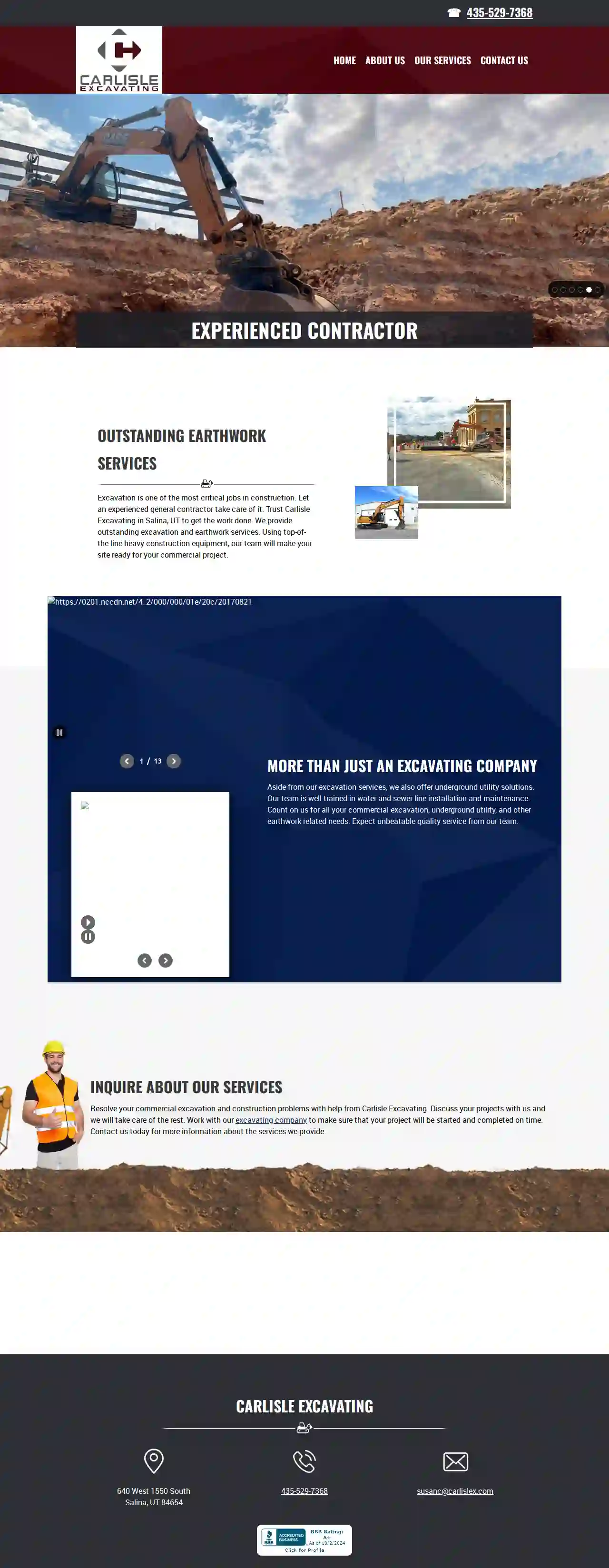Excavation Contractors Cumbria
Find top Excavation Contractors Near Me in Cumbria
Get multiple Excavation Companies quotes for your project today! Compare profiles, reviews, accreditations, portfolio, etc... and choose the best deal.

Anthony & Graham Chaplow Landscaping Ltd
513 reviewsKendal, GBAbout Chaplow Chaplow is a family-run business with over 20 years of experience in the landscaping and groundworks industry. We are based in Kendal, Cumbria, and we serve the surrounding areas. We are passionate about creating beautiful and functional outdoor spaces that our customers can enjoy for years to come. We offer a wide range of services, including: Driveways Gardens Groundworks Landscaping Patios Resin Bonded Sleepers Walling We are committed to providing our customers with the highest quality workmanship and customer service. We are also fully insured and accredited, so you can rest assured that your project is in safe hands. If you are looking for a reliable and experienced landscaping and groundworks company, then please get in touch with us today. We would be happy to discuss your project and provide you with a free, no-obligation quote.
- Services
- Why Us?
- Gallery
Get Quote- Ho
Howard Armstrong Drainage
517 reviewsCarlisle, GB- Services
- Why Us?
Get Quote 
Carlisle Excavating
4.88 reviews640 West 1550 South, Salina, 84654, GBDependable Construction Company Hire a reputable contractor to work on your construction project. When it comes to prompt and dependable commercial excavation services, Carlisle Excavating in Salina, UT is the construction company you can count on. We are committed to delivering high-quality work that will give you complete satisfaction. Our team has extensive experience in the industry and can handle minor to complicated earthmoving jobs. We serve the southern half of the state of Utah. Why Choose Us? Equipped, Honest, and Knowledgeable Team Excellent Customer Service Free Estimates Available Licensed and Insured Construction Company Quick Turnaround Time Give Us a Call Today Every member of our staff works hard to earn your trust and exceed your expectations. Place your confidence in our construction team and you will not be disappointed with the quality of work. Give us a call today to learn more about our excavation and other earthmoving services. We are more than happy to assist you with your concerns.
- Services
- Why Us?
- Gallery
Get Quote- Co
Construction in Level
51 reviewsKendal, GB- Services
- Why Us?
Get Quote - Bo
Border Groundworks and Maintenance
52 reviewsCarlisle, GB- Services
- Why Us?
Get Quote - Ki
Kirkaldy & Roe Ltd
3.73 reviewsCarlisle, GB- Services
- Why Us?
Get Quote - St
Stephen Carruthers
1Carlisle, GB- Services
- Why Us?
Get Quote - Ke
Kendall Trucking Excavating
4.219 reviewsKendal, GB- Services
- Why Us?
Get Quote 
SJ Services, Birks LA8 Kendal
1Kendal, GBSJ Services provide excavator services throughout the UK. We specialize in site clearances and mechanized arb. With our wide range of knowledge and expertise we are always looking for the most efficient and sustainable way for our clients to reach there goals. Get in touch today to learn more about what we can offer you and to receive your free no obligation quote.
- Services
- Why Us?
- Testimonials
- Gallery
Get Quote- An
Andrew Harvey Ltd
1Kendal, GB- Services
- Why Us?
Get Quote
Over 11,537+ Excavation Contractors on our platform
Our excavation companies operate in Cumbria & surroundings!
ExcavationHQ has curated and vetted the Best Excavation Contractors in Cumbria. Find a reliable business today.
Frequently Asked Questions About Excavation Contractors
- Clear the Area: Remove any obstacles, including vehicles, outdoor furniture, landscaping features, or structures, from the excavation zone and surrounding area.
- Mark Existing Features: Identify and mark underground utilities, septic tanks, sprinkler systems, or other buried elements you want to protect.
- Protect Landscaping: Use tarps or fencing to shield trees, shrubs, gardens, or other landscaping elements from damage.
- Provide Access: Ensure the excavation contractor has clear access to the work area, including gates wide enough for equipment.
- Discuss Logistics: Coordinate with the contractor regarding parking arrangements, material delivery, and any special instructions or concerns you might have.
- Planning and Surveying: Defining the excavation area, marking utility lines, and determining the required depth and grade.
- Site Preparation: Clearing vegetation, removing obstacles, and ensuring site accessibility.
- Excavation: Using appropriate equipment (excavators, backhoes, etc.) to remove earth and create the desired excavation.
- Hauling and Disposal: Transporting excavated material to designated disposal sites, complying with environmental regulations.
- Backfilling and Compaction: Refilling the excavation with suitable material and compacting it to achieve the required density and stability.
- Grading and Finishing: Leveling and shaping the surface to the final grade for landscaping or construction.
- Determine the Area: Measure the length and width of the area you want to fill. Multiply them to get the area in square feet (or meters).
- Determine the Depth: Measure the difference between the existing grade and the desired grade (how much you need to raise the ground). This is the depth of fill required.
- Calculate Volume: Multiply the area (step 1) by the depth (step 2) to get the volume in cubic feet (or meters).
- Account for Compaction: Fill dirt compacts when it settles, so add 10% to 25% to the calculated volume to account for compaction. The exact percentage depends on the type of fill material.
- Basement Size: The larger the basement, the more excavation is required, increasing the cost.
- Soil Type: Excavating rocky or dense clay soil is generally more expensive than loose soil.
- Accessibility: Difficult-to-access sites might require specialized equipment or more labor, driving up costs.
- Foundation Type: The chosen foundation type (full basement, crawl space, slab) affects excavation needs.
- Underpinning: If underpinning (strengthening existing foundations) is necessary, it significantly increases costs.
- Disposal Fees: Hauling excavated soil to disposal sites adds to the overall expense.
How do I prepare my property for excavation?
What is the excavation process?
How do I calculate how much dirt I need for fill?
How much does it cost to excavate a basement?
How do I prepare my property for excavation?
- Clear the Area: Remove any obstacles, including vehicles, outdoor furniture, landscaping features, or structures, from the excavation zone and surrounding area.
- Mark Existing Features: Identify and mark underground utilities, septic tanks, sprinkler systems, or other buried elements you want to protect.
- Protect Landscaping: Use tarps or fencing to shield trees, shrubs, gardens, or other landscaping elements from damage.
- Provide Access: Ensure the excavation contractor has clear access to the work area, including gates wide enough for equipment.
- Discuss Logistics: Coordinate with the contractor regarding parking arrangements, material delivery, and any special instructions or concerns you might have.
What is the excavation process?
- Planning and Surveying: Defining the excavation area, marking utility lines, and determining the required depth and grade.
- Site Preparation: Clearing vegetation, removing obstacles, and ensuring site accessibility.
- Excavation: Using appropriate equipment (excavators, backhoes, etc.) to remove earth and create the desired excavation.
- Hauling and Disposal: Transporting excavated material to designated disposal sites, complying with environmental regulations.
- Backfilling and Compaction: Refilling the excavation with suitable material and compacting it to achieve the required density and stability.
- Grading and Finishing: Leveling and shaping the surface to the final grade for landscaping or construction.
How do I calculate how much dirt I need for fill?
- Determine the Area: Measure the length and width of the area you want to fill. Multiply them to get the area in square feet (or meters).
- Determine the Depth: Measure the difference between the existing grade and the desired grade (how much you need to raise the ground). This is the depth of fill required.
- Calculate Volume: Multiply the area (step 1) by the depth (step 2) to get the volume in cubic feet (or meters).
- Account for Compaction: Fill dirt compacts when it settles, so add 10% to 25% to the calculated volume to account for compaction. The exact percentage depends on the type of fill material.
How much does it cost to excavate a basement?
- Basement Size: The larger the basement, the more excavation is required, increasing the cost.
- Soil Type: Excavating rocky or dense clay soil is generally more expensive than loose soil.
- Accessibility: Difficult-to-access sites might require specialized equipment or more labor, driving up costs.
- Foundation Type: The chosen foundation type (full basement, crawl space, slab) affects excavation needs.
- Underpinning: If underpinning (strengthening existing foundations) is necessary, it significantly increases costs.
- Disposal Fees: Hauling excavated soil to disposal sites adds to the overall expense.